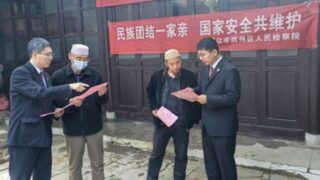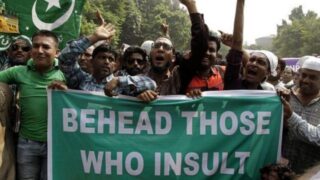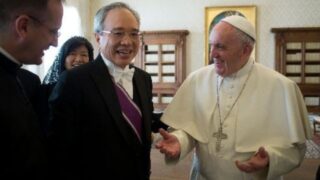On December 7, the elevation to trial was annulled. The case was sent back to Judge Lijo, with the dissenting opinion of one Appeal judge who would have acquitted the defendants immediately.
by Alessandro Amicarelli
Article 3 of 4. Read article 1 and article 2.


On December 7, 2023, the Court of Appeals issued three rulings regarding the appeals filed by the defense discussed in article 2 of this series (two on appeal and one on complaint).
1.Ruling on the appeal of the rejection of the nullity action and the complaint on the rejection of the appeal against the elevation to trial.
In response to these defense appeals, by majority vote, the opposition to the elevation to trial and the nullity of the closing of the investigation were accepted by the Court of Appeals. In the evaluation of these issues, the arguments of the defense were analyzed in depth. It was concluded that Judge Lijo had acted hastily when he granted a hearing to the prosecution to close the investigation. In his opinion, Judge Martín Irurzun pointed out that, after the decree of July 4, the investigative activity had continued, since the MPF presented new elements and an additional report to which the defense objected. He also indicated that the magistrate himself, when ordering the partial closure and the elevation to trial, stated that the seized documentation and electronic elements were still being analyzed and that he had just received the new reports from the MPF. In fact, the latter judge’s order took place only two days after the DATIP report was filed. In other words, at the time of its closing, the investigation was by no means complete. On the other hand, Judge Irurzun remarked that the evaluation of the expert results by the Forensic Medical Corps of the CSJN and the elements introduced by the MPF only took place in the order of elevation to trial which, as mentioned earlier, is non-appealable. This way, Judge Lijo limited the possibility of the parties to comment on the incidence or validity of such new documents.
In his turn, Judge Roberto Boico clarified that, according to standard procedure, when new evidence has surfaced that affects the procedural situation of the accused after a final indictment, there must be a possibility of open bilateral debate, in accordance with the principle of congruence and the right to defense in court.
This is provided for in the law and, for that reason, it is foreseen that the indictment may be mutable in such circumstances and may be modified ex officio. He explained that in this way, as a guarantee, a “dialogic procedural instrument” is instituted prior to the closing of the investigation, allowing the parties to discuss and question the evidentiary aspects that may affect the situation of the accused. Therefore, according to him, the closing of the possibility of discussion in the face of new evidence is contrary to the law, otherwise the elevation to trial should logically be appealable to safeguard the rights of the defense.
In the particular case that was the object of the complaint, Boico pointed out that the need for a bilateral discussion was evident, given that on November 4, 2022 “when reviewing the indictment, the majority of the court that confirmed it held that it was necessary to exhaust several pending evidentiary proceedings, especially the one referring to the expert opinions/Gesell Chamber statements of the alleged victims. This evidence was especially indicated as pending by the reviewing judicial body, and this circumstance makes the debate that did not take place even more audible.”
Thus, the magistrate affirmed that the order of elevation to trial is not the appropriate place to evaluate new evidence that was not duly discussed in previous procedural instances. He then concluded that “the complaint raised here is admissible to the extent that the defense demands, and rightly so, the possibility of a review for aspects that it was not able to dispute/discuss with the prosecution.”
Finally, Boico agreed with Irurzun that Judge Lijo himself, in his order of elevation to trial, ordered to continue receiving statements and producing evidence on the facts under investigation. This situation was contradictory to the action of closing the investigation stage and showed that the decree issued on July 4 lacked support.


Consequently, the majority resolved to declare null and void the act by which the prosecutor’s office was heard for the closing of the investigation (July 4) and all the consequent acts, as well as to entrust the judge with the examination and treatment of the arguments made by the parties regarding the validity or otherwise of the new elements submitted. Judge Lijo was also instructed to deal with the objections of a constitutional nature introduced by the defense: the right to freedom of choice, freedom of thought, and freedom of religion or belief.
2.Ruling on the appeal of the rejection of the exception for lack of action.
In the exception for lack of action, as previously mentioned, the defense argued that the facts investigated did not constitute a crime because the medical (psychiatric and psychological) experts scientifically demonstrated that there were no victims of human trafficking. This, together with the fragility of the prosecution’s arguments, meant that all the defendants should be acquitted. In relation to these arguments, after revoking the elevation to trial, the Court of Appeals decided by a majority to order Judge Lijo to reexamine the plea of lack of action once the preceding orders had been complied with.
It is interesting to review the opinion of Judge Eduardo Farah, who in dissent from his two colleagues, voted for the acquittal of all the defendants.
In his opinion, Judge Farah made a detailed review of his previous vote on the occasion of the appeal to the indictments in November 2022, in which he evaluated the difficulties and risks of judging private and intimate decisions in relation to the religious and spiritual beliefs of individuals, which are protected by the Argentinian Constitution and the international covenants the country has signed and ratified. Thus, the magistrate observed, “the procedural object of this case touches—in my opinion—very delicate issues that affect principles and rights essential to our constitutional model”.
What is at stake, Judge Farah wrote, is “freedoms such as those of self-determination, of expression of ideas, of worship, of association for useful purposes, of teaching and learning, and those contained in articles 14 and 19 of the National Constitution and in different provisions of the American Declaration of the Rights and Duties of Man, of the Universal Declaration of Human Rights, of the American Convention on Human Rights, and of the International Covenant on Civil and Political Rights.”
After this, Judge Farah pointed out the evidentiary shortcomings he had indicated on that occasion, and again mentioned the weakness of the report produced with very little information by the PNR, in which certain assertions were made about psychological subjugation of “victims” allegedly practiced by “cults,” which in his opinion were not persuasive. He then developed a detailed evaluation of the medical expert reports and took into account the active participation of the alleged victims, who consistently supported the position of the defense. As he explained, all the statements of the nine women were consistent over time and emphatic in affirming their self-determination and their anger at the quality of victims that had been imposed on them by the prosecutors and the judge.


Based on this analysis, Judge Farah observed that the alleged victims did not show symptoms or signs of psycho-pathological disorders or alterations, nor psychotic disorders or intellectual deficits. He added that “there were no symptoms compatible with post-traumatic stress or indicators of trauma related to sexual subjugation or enslavement or any form of ‘depersonalization’ or ‘brainwashing’ as alleged in the accusation in the case file.” Thus, he concluded, it was possible to affirm that the mental faculties of these women were normal. On the other hand, the judge concluded that the alleged victims’ membership and participation in the BAYS was always voluntary and that this had not impeded or affected their full social integration.
In addition to this, Judge Farah pointed out that no indicators of vulnerability or any other situation were identified that would allow to sustain that the women were manipulated, unduly influenced, or controlled. The magistrate also stated that these conclusions were reflected in the impression he had gained from the statements made by the alleged victims in the hearings held before the court, “in which they emphatically denied having been victims of trafficking or any imposition to do, not do, or tolerate anything against their will. They defended their own ideals and life choices, just as they had done in their statements made in the Gesell Chamber.” All this led Farah to rule out that the nine women’s own accounts in the case could be disqualified on scientific grounds.
Based on these assessments, Judge Farah considered that the exposure of private matters of the nine women concerning their personality, their intimacy, and their life choices was “more than enough to rule out the need for any further inquiry, interrogation or molestation in the future, which I reaffirm based on the impression I gathered from the statements made by these persons in the hearings held before the Court.” For the above reasons, then, his vote proposed to revoke the appealed resolution, to uphold the exception filed and to dismiss the charges against all the accused in relation to the facts for which they were investigated and prosecuted.









